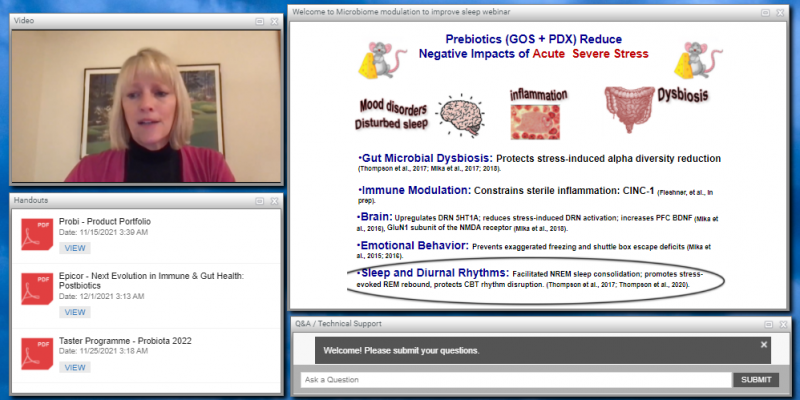Proper sleep is vital for a healthy body and mind. Amassing research is drilling down on the role of the microbiome in the complicated matter of sleep rhythms and harmful impacts of deprivation and/or disruption from jet lag, night shift work, and sleep apnea.
On December 9, Nutraingredients-USA presented a free one-hour webinar titled Microbiome Modulation to Improve Sleep to address some of the most recent research.
Stephen Daniells, Ph.D., editor-in-chief of William Reed Business Media, moderated the panel with support from sponsors Probi and Epicor.
Presenters
Joe Alcock, MD MSCR, Professor in the Department of Emergency Medicine, University of New Mexico
Dr. Alcock brings real-world experience in his busy emergency room to his clinical work on night shift work and microbiome impact. He presented data from recent work on oral bacteria and how they change from night to day. Dr. Alcock reported that though there were no big changes in taxa, bacteria did show shifts in oscillating patterns in some research. He is also looking at stress hormone exposure and links to pathogens and microbiota changes.
Simone Pyle, Ph.D., Science and Technology Manager, focused on the microbiome, Unilever
Dr. Pyle reviewed studies showing differences in gut microbiota diversity and composition in sleep deprivation vs. sleep sufficiency. She discussed the importance of the gut-brain axis and the neural, immune and endocrine pathways in connection to GI and mental health disorders. Her research interests include pre-, post-, pro-, and syn-biotics and their impacts on sleep and mental health.
Monika Fleshner, Ph.D., Professor of Integrative Physiology, Director of the Stress Physiology Laboratory, University of Colorado
Dr. Fleshner focused on the potential role of commensal bacteria in stress response and adaptability. She described the circular way that stress impacts sleep and vice versa. In modulating the microbiota to increase stress robustness, Dr. Flesher reported positive results with the use of prebiotics. Mechanisms of action such as prebiotics’ impact on bile acid composition were discussed. Her current work includes research with the US military into the effects of chronic circadian disruption.
Q&A
Following the individual presentations, the panel fielded viewers’ questions on how aging, gender and obesity relate to sleep and patterns of microbial changes.
Dr. Daniells asked if the panel had any last thoughts on the way forward.
While there were several provocative “burning questions”, Dr. Alcock reflected from his frontline perch in the ER: “How do we translate this science into solutions so we can have a major impact on health?”
Webinar available free on-demand
If you were still snoozing in some distant time zone during the live webinar, you can catch it on-demand for three months at NutraIngredients-USA.

